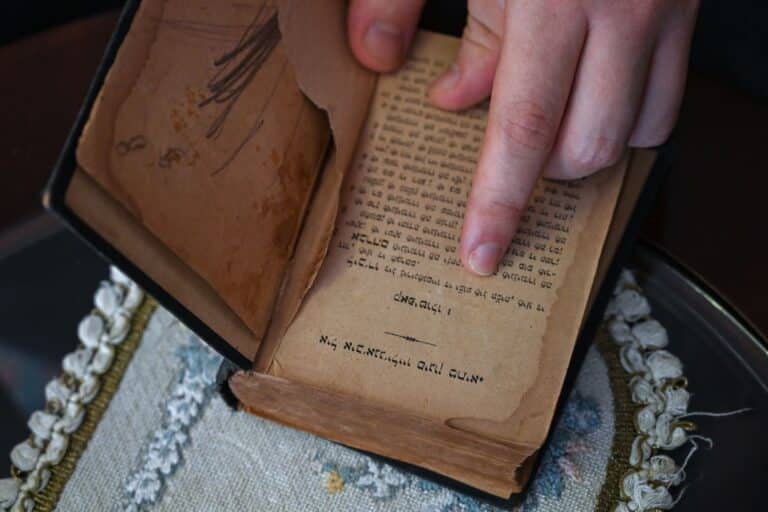
Ladino, also known as Judeo-Spanish, is the written and spoken language of Jews who originated from the Iberian Peninsula (Spain and Portugal). The language originally developed from Medieval Spanish blended with elements of Hebrew and Aramaic.
Unlike Yiddish, there’s no Duolingo course on Ladino quite yet. Hopefully someday that will change, said Alexandra Fellus, the editor of the Sephardic Brotherhood of America’s Ladino magazine. She is part of the small but mighty group working to keep the centuries-old language of her Jewish ancestors alive.
Ladino is only spoken by a few hundred thousand people today. You can hear smatterings of the centuries-old language throughout the Israeli TV series “Beauty Queen of Jerusalem.” (Read more: The true story behind “Beauty Queen of Jerusalem.”)
We partnered with Fellus, who runs the Instagram account and blog ‘Ladino with Lex,’ to bring you 13 essential Ladino words and phrases everyone should know.
Ke haber?
Ke haber is an essential Ladino greeting that translates to “what’s new” or “what’s up?” It’s the Ladino equivalent to the English, “how are you?”
Guay de mi
Guay de mi means “oh my” AKA the Ladino version of “oy!” It’s used to express frustration, sympathy or concern.
Ladino with Lex tip: The “guay” is pronounced like “why” in English. Make sure to nail the pronunciation if you want to sound like a pro!
Kerido
In Ladino, Kerido is a term of endearment that means “my love.”
Mi alma/ Mi vida
Mi alma and mi vida are also two terms of endearment which mean “my heart” and “my life.” We know— calling a loved one “my life” might sound a little strong in English. In Ladino, these phrases are used much more regularly and aren’t that intense. A parent might refer to their child as mi vida, mi alma or kerido just as much as a romantic partner.
Ijo/Ija de ken sos tu?
Ijo(masculine) or ija(feminine) de ken sos tu is a phrase that means “you are the child of whom?” This is something you’d say when you meet someone for the first time. Simply put, this is used to play Sephardic Jewish geography.
Echar lashon
Echar lashon literally translates to “to throw tongue.” It used to mean chit chat or even gossip— it’s bascially the Ladino equivalent of schmooze.
Kaminando kon buenos
Kaminando kon buenos means “let’s walk with good” AKA surround yourself with good people. Pretty sage advice.
Una grande bamya
In Ladino, when you want to say “oh no!” you might say es una grande bamya which literally means “it’s a big okra”— yes, like the vegetable okra. This phrase is commonly used to mean “a big problem.” We’re not sure what native Ladino speakers had against okras — perhaps it is that when okras are left to grow too large, they become woody and tough, making them difficult to eat.
Bendichas manos
This is an important one if you like to cook and eat. Bendichas manos literally translates to “blessed hands.” This Sephardic phrase is used to compliment someone for their cooking. For example, if your aunt makes the best bourekas, you might tell her she has bendichas manos– especially if you want her to make them again.
Diremos bien para ke todo se aga bien
This Ladino phrase means “let’s say everything is good, so that everything will be good.” In other words, be positive if you want to manifest a positive outcome. An optimistic phrase we can all get behind.
Si kere el dio
Si kere el dio means “if Gd wills it” or more simply “Gd willing.” Most importantly, this phrase is used to protect yourself against the evil eye.
Nochada buena
In Ladino, “good night!”
What phrases did we miss? Let us know on Instagram, Twitter, and TikTok!
Originally Published Jul 18, 2022 12:02AM EDT


